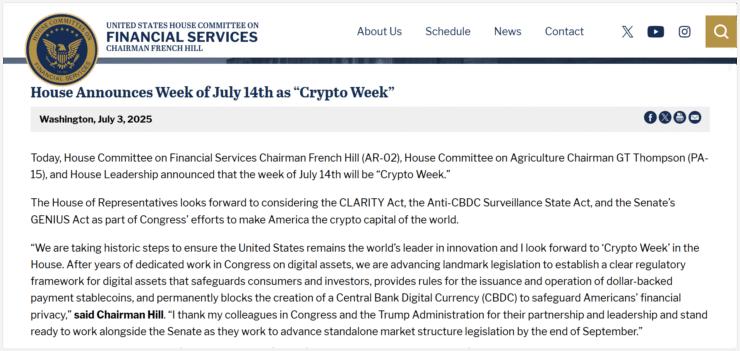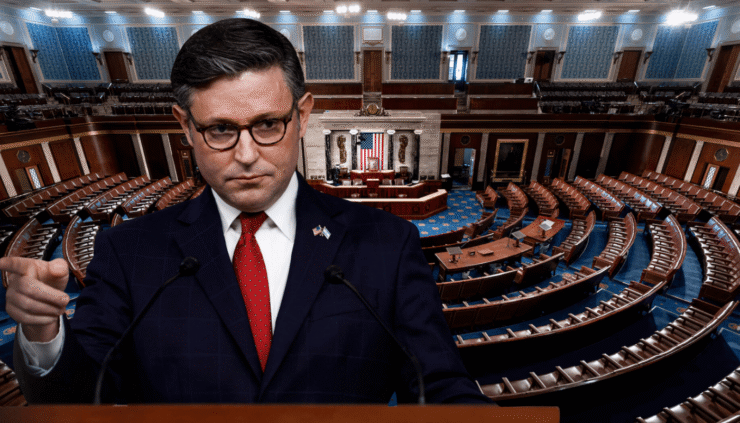Following the passage of President Donald Trump’s sweeping reconciliation package, House Republican leaders have announced that mid-July will be dedicated to advancing legislation on stablecoins and broader crypto regulations.
Speaker Mike Johnson, alongside Financial Services Committee Chair French Hill and Agriculture Committee Chair GT Thompson, confirmed that the week of July 14 will be designated as “Crypto Week.” The agenda will include debate over a Senate-approved stablecoin measure, a comprehensive market structure bill, and legislation targeting the issuance of central bank digital currencies.
“House Republicans are taking decisive steps to deliver the full scope of President Trump’s digital assets and cryptocurrency agenda,” Johnson said in a statement outlining the schedule.
The decision underscores GOP leaders’ efforts to align digital asset policy with the Trump administration’s priorities before the summer recess.

Senate-Backed Stablecoin Bill Takes Center Stage
While the House Financial Services Committee previously advanced its own stablecoin proposal known as the STABLE Act, lawmakers are now signaling plans to prioritize the Senate’s version, dubbed the GENIUS Act.
The GENIUS legislation mandates that all stablecoins be fully backed by cash or highly liquid reserves, requires large issuers to undergo annual audits, and sets rules for foreign-operated tokens. President Trump has repeatedly emphasized that he wants a stablecoin bill ready for his signature by August, making the Senate framework the fastest path forward.
Although the House bill differs in provisions like state licensing and treatment of offshore issuers, adopting the Senate-approved text could streamline negotiations.
The House committee cleared the STABLE Act earlier this year, but it has yet to be scheduled for a floor vote.
Market Structure Overhaul and CBDC Restrictions Also Planned
In addition to stablecoin policy, House Republicans will use “Crypto Week” to advance the Digital Asset Market Clarity Act—a bill designed to define how federal agencies oversee crypto markets.
The legislation would split jurisdiction between the SEC and the CFTC, require exchanges and custodians to separate client and corporate funds, and impose disclosure obligations on firms serving retail customers.
Democratic lawmakers have criticized the proposals, citing both regulatory concerns and President Trump’s substantial financial ties to the sector. Bloomberg estimates Trump has earned over $600 million through crypto ventures, including token launches and decentralized finance projects.
Also on the docket is a proposal spearheaded by Majority Whip Tom Emmer to prohibit the Federal Reserve from launching a central bank digital currency accessible directly to consumers.
Quick Facts
- The House will designate the week of July 14 as “Crypto Week” to debate stablecoin and market structure bills.
- Lawmakers are leaning toward adopting the Senate’s GENIUS Act to meet the administration’s August deadline.
- Additional legislation will address central bank digital currencies and regulatory oversight of crypto markets.





